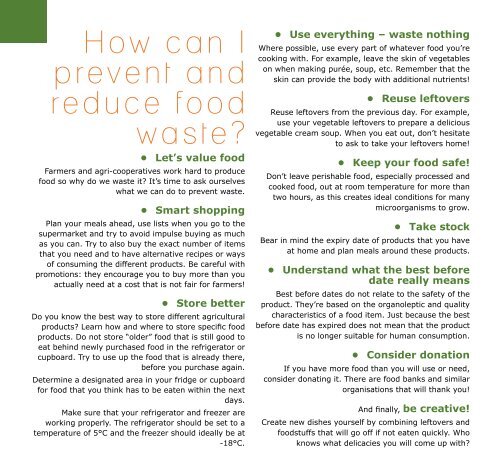Final recipes book
You also want an ePaper? Increase the reach of your titles
YUMPU automatically turns print PDFs into web optimized ePapers that Google loves.
How can I<br />
prevent and<br />
reduce food<br />
waste?<br />
• Let’s value food<br />
Farmers and agri-cooperatives work hard to produce<br />
food so why do we waste it? It’s time to ask ourselves<br />
what we can do to prevent waste.<br />
• Smart shopping<br />
Plan your meals ahead, use lists when you go to the<br />
supermarket and try to avoid impulse buying as much<br />
as you can. Try to also buy the exact number of items<br />
that you need and to have alternative <strong>recipes</strong> or ways<br />
of consuming the different products. Be careful with<br />
promotions: they encourage you to buy more than you<br />
actually need at a cost that is not fair for farmers!<br />
• Store better<br />
Do you know the best way to store different agricultural<br />
products? Learn how and where to store specific food<br />
products. Do not store “older” food that is still good to<br />
eat behind newly purchased food in the refrigerator or<br />
cupboard. Try to use up the food that is already there,<br />
before you purchase again.<br />
Determine a designated area in your fridge or cupboard<br />
for food that you think has to be eaten within the next<br />
days.<br />
Make sure that your refrigerator and freezer are<br />
working properly. The refrigerator should be set to a<br />
temperature of 5°C and the freezer should ideally be at<br />
-18°C.<br />
• Use everything – waste nothing<br />
Where possible, use every part of whatever food you’re<br />
cooking with. For example, leave the skin of vegetables<br />
on when making purée, soup, etc. Remember that the<br />
skin can provide the body with additional nutrients!<br />
• Reuse leftovers<br />
Reuse leftovers from the previous day. For example,<br />
use your vegetable leftovers to prepare a delicious<br />
vegetable cream soup. When you eat out, don’t hesitate<br />
to ask to take your leftovers home!<br />
• Keep your food safe!<br />
Don’t leave perishable food, especially processed and<br />
cooked food, out at room temperature for more than<br />
two hours, as this creates ideal conditions for many<br />
microorganisms to grow.<br />
• Take stock<br />
Bear in mind the expiry date of products that you have<br />
at home and plan meals around these products.<br />
• Understand what the best before<br />
date really means<br />
Best before dates do not relate to the safety of the<br />
product. They’re based on the organoleptic and quality<br />
characteristics of a food item. Just because the best<br />
before date has expired does not mean that the product<br />
is no longer suitable for human consumption.<br />
• Consider donation<br />
If you have more food than you will use or need,<br />
consider donating it. There are food banks and similar<br />
organisations that will thank you!<br />
And finally, be creative!<br />
Create new dishes yourself by combining leftovers and<br />
foodstuffs that will go off if not eaten quickly. Who<br />
knows what delicacies you will come up with?


